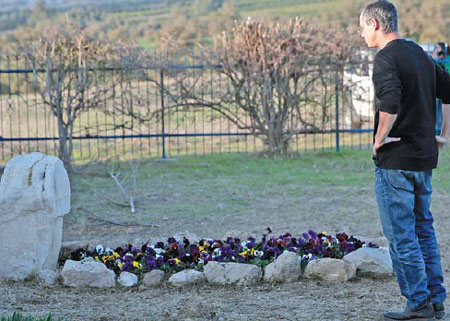Israelis pay respects to Sharon at parliament

Former prime minister died on Saturday after eight years in a coma
Israelis were on Sunday paying their respects to Ariel Sharon, whose controversial life inspired admiration and provoked revulsion and whose death drew emotional reactions even after eight years in a coma.
Celebrated as a military hero at home, recognized as a pragmatic politician abroad and despised as a bloodthirsty criminal by the Palestinians and the Arab world, the former premier was nothing if not a polarizing figure.
But Israelis of all stripes acknowledged the burly 85-year-old as a key figure in their nation's history, his death on Saturday leaving President Shimon Peres as the Jewish state's last surviving founding father.
Ahead of his funeral on Monday, Sharon's body was to lie in state at the Knesset, Israel's parliament, to allow the public to pay their last respects.
His coffin left the Tzrifin military base en route for Jerusalem on Sunday morning, with Peres expected to pay his respects and lay a wreath shortly before the arrival of the public, officials said.
He will be buried on Monday afternoon at his ranch in the southern Negev desert after a military ceremony.
A state memorial is planned for Monday with the participation of leaders from Israel and around the world, the prime minister's office said.
US Vice-President Joe Biden, former British Prime Minister Tony Blair, Czech Prime Minister Jiri Rusnok, German Foreign Minister Frank-Walter Steinmeier and others will attend, it added.
The burly white-haired former general had been in a coma since Jan 4, 2006, following a massive stroke which felled him at the height of his political career. His condition took a sudden turn for the worse on New Year's Day when he suffered serious kidney problems after surgery.
Sharon's career stretched across Israel's 65-year existence and his life was intertwined with the country's history.
As one of Israel's most famous generals, Sharon was known for bold tactics and an occasional refusal to obey orders. Historians credit him with helping turn the tide of the 1973 Mideast war when Arab armies launched a surprise attack on Israel on the solemn fasting day of Yom Kippur, causing large Israeli casualties.
As a politician, he became known as "the bulldozer" - a man contemptuous of his critics while also capable of getting things done. He was elected prime minister in 2001.
Massacre
While many are mourning the loss of Sharon, others across the Arab world are celebrating his death. They blame him for the massacre of hundreds of Palestinian civilians in the Sabra and Shatila refugee camps in Beirut in 1982.
The killings were conducted by militiamen allied to Israel during Lebanon's 1975-90 civil war. Israeli troops did not intervene during the bloodshed, which is remembered as one of the worst atrocities of the war.
A 1983 Israeli inquiry found Sharon bore "personal responsibility" for not preventing the bloodshed, pushing him to resign as defense minister. But less than two decades later he rose to lead his Likud party and was elected prime minister.
Youssef Hamzeh, who was present at the massacres said, "As a witness to this person and from what I suffered from this person, I say to hell with Sharon and Sharon's supporters in the Israeli leadership who still commit massacres."
AFP-AP-Reuters
|
The son of Ariel Sharon visits his mother's grave on Saturday at a private farm in South Israel, where Sharon will also be buried. Xinhua |
|
Palestinian refugees in the Shatila refugee camp hand out sweets to celebrate following the news of the death of former Israeli premier Ariel Sharon on Saturday. Anwar Amro / AFP Photo |
(China Daily 01/13/2014 page12)
















